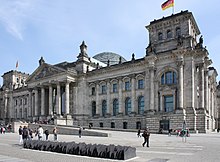Otto Geiselhart
Otto Geiselhart (born December 8, 1890 in Dinkelscherben , Zusmarshausen office ; † March 18, 1933 in Günzburg ) was a German politician ( SPD ).
Live and act
After attending primary school, Geiselhart learned the cheese-making trade. In 1915 he married. From 1914 to 1916 Geiselhart took part in the First World War, from which he returned home as a war disabled. From June 1, 1916, he worked for the general local health insurance fund in Günzburg district office. On February 1, 1925, he was promoted to managing director.
From January 12, 1919 to June 6, 1920 Geiselhart was a member of the Bavarian state parliament . From June 20, 1919 to May 1, 1924 he was also a city councilor in the Swabian town of Burgau and a member of the Günzburg-Burgau district council. On January 1, 1925, he took over the office of the city council of Günzburg instead.
In February 1929, Geiselhart entered the fourth Reichstag of the Weimar Republic , elected in May 1928 , in the replacement procedure for the deceased MP Alwin Saenger , in which he represented constituency 24 (Upper Bavaria-Swabia) until September 1930.
On March 12, 1933, a few weeks after the National Socialists “ seized power ” , Geiselhart was arrested by the new rulers and taken to the district court prison in Günzburg. There he died on the night of March 18th. Most research assumes that Geiselhart took his own life out of fear of the concentration camp, although a suicide disguised as murder cannot be ruled out with absolute certainty. According to a report by Geiselhart's son, his father “did not want to go to the concentration camp and he wanted to set an example”. In the funeral meeting of the Günzburg city council on March 20, the city's mayor, Hanner, praised Geiselhart as a man who had always displayed "respectable moral pathos" in his political attitude, a man of great intellectual gifts and a man who "always open and honest for […] [advocated] what he thought was right ”.

Honors
Today, Otto-Geiselhart-Straße in Günzburg and a memorial plaque, which is part of the memorial in memory of 96 members of the Reichstag murdered by the Nazi regime , remind of Geiselhart's life and political activities.
Web links
- Otto Geiselhart in the database of members of the Reichstag
- Otto Geiselhart in the parliamentary database at the House of Bavarian History
Individual evidence
- ↑ Martin Broszat / Elke Fröhlich: Bayern in der NS-Zeit , p. 341. Also: Streiflichter on the history of the workers' movement in the district of Günzburg from the beginnings to 1945 , Günzburg, undated, p. 92f.
- ↑ Quoted by Martin Schumacher (ed.): MdR Die Reichstag members of the Weimar Republic in the time of National Socialism. Political persecution, emigration and expatriation 1933-1945. Droste-Verlag, Düsseldorf 1991, ISBN 3-7700-5162-9 , p. 231.
- ^ Sven Keller: Günzburg and the case of Josef Mengele , 2003, p. 101.
| personal data | |
|---|---|
| SURNAME | Geiselhart, Otto |
| BRIEF DESCRIPTION | German politician (SPD), MdR |
| DATE OF BIRTH | December 8, 1890 |
| PLACE OF BIRTH | Shards of spelled |
| DATE OF DEATH | March 18, 1933 |
| Place of death | Gunzburg |
